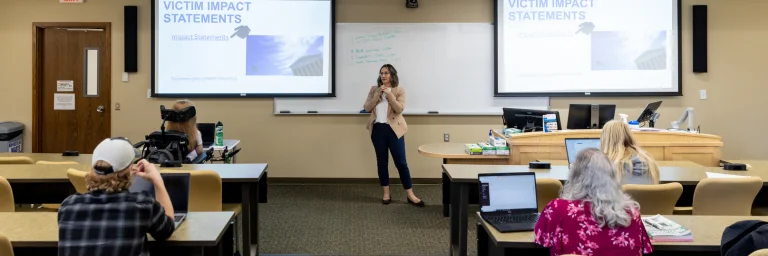Criminal Justice Studies
Be an agent of change in our justice system.
Graduate ready to enter a law enforcement academy, pursue graduate studies or law school, or make your mark in policing, courts, corrections, government and other careers in criminal justice.
- Program type:
- Minor
- Format:
- On Campus or Online
- Est. time to complete:
- 1-2 years
- Credit hours:
- 21
Why minor in Criminal Justice?
From enforcing the law to protecting your community to advocating on behalf of victims, criminal justice opens the door to a world of opportunities. A minor in this dynamic field puts you on the front lines of public safety and justice.
You will gain:
- Expertise in many different aspects of law enforcement, corrections, juvenile justice, and legal reasoning
- A deep understanding of the law, victims, criminal behavior, crime prevention, and social justice
- A broad view of the criminal justice system
What majors pair well with a Criminal Justice minor?
Combining a Criminal Justice minor with certain majors can enhance your skill set and broaden your career options. Or deepen your expertise with a bachelor’s degree in Criminal Justice. Here are some bachelor’s degrees that pair well with a Criminal Justice minor:
- Psychology Degree: Understanding human behavior is crucial in criminal justice. A background in psychology provides insight into the motivations behind criminal actions and helps in developing strategies for crime prevention and rehabilitation.
- Sociology Degree: Sociology provides a broader perspective on societal structures, including how institutions like the criminal justice system operate within larger social contexts. It can offer valuable insights into crime patterns, inequality, and social justice issues.
- Social Work Degree: Social work focuses on helping individuals and communities overcome challenges, including those related to crime, poverty, and social injustice. It complements criminal justice by emphasizing intervention, rehabilitation, and social support services.
- Forensic Science Degree: This major focuses on the scientific analysis of evidence in criminal investigations. It provides knowledge of forensic techniques, crime scene investigation, and evidence analysis.
- Political Science Degree: Political science provides an understanding of the political processes and institutions that shape criminal justice policies and practices. It can be beneficial for those interested in the intersection of law, politics, and public policy.
Minor in Criminal Justice at UND
-
Study with faculty who have doctoral degrees from some of the top programs in the world.
-
Be challenged to think creatively and critically.
-
Join the UND Criminal Justice Association, Native Americans into Criminal Justice Association or Alpha Phi Sigma, the national Criminal Justice Honor Society.
-
Ranked as a Top 50 criminal justice program according to Successful Student.
-
Choose from a broad range of electives tailored to your interests like policing, corrections, law, victimology, cybersecurity, criminology, data analytics or forensic science.
Criminal Justice Minor Courses
Lead Your Way
Stephanie Clarke is a member of Track & Field, a double major in Psychology and Criminal Justice, and the first in her family to earn a college degree.
